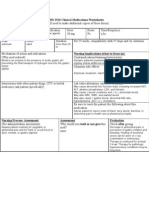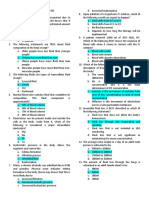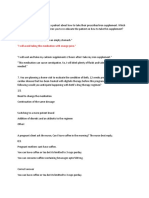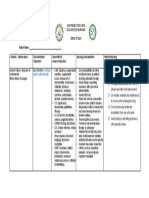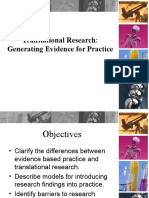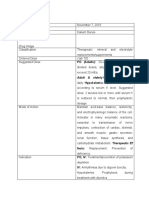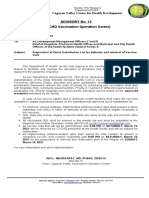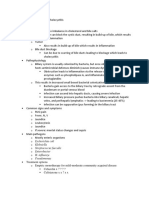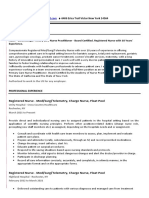0 ratings0% found this document useful (0 votes)
205 viewsNursing Intervention Prostate Cancer
Nursing Intervention Prostate Cancer
Uploaded by
Kathleen Dimacali1. The document outlines nursing interventions for prostate cancer including psychological support, education on disease and treatments, and comfort measures.
2. Independent nursing interventions focus on relieving anxiety through support and open communication, while reinforcing education on the diagnostic and treatment process.
3. Dependent nursing interventions include administering analgesics, chemotherapy, antiemetics, and IV fluids as directed based on the treatment plan which may involve surgery or chemotherapy.
Copyright:
© All Rights Reserved
Available Formats
Download as DOCX, PDF, TXT or read online from Scribd
Nursing Intervention Prostate Cancer
Nursing Intervention Prostate Cancer
Uploaded by
Kathleen Dimacali0 ratings0% found this document useful (0 votes)
205 views2 pages1. The document outlines nursing interventions for prostate cancer including psychological support, education on disease and treatments, and comfort measures.
2. Independent nursing interventions focus on relieving anxiety through support and open communication, while reinforcing education on the diagnostic and treatment process.
3. Dependent nursing interventions include administering analgesics, chemotherapy, antiemetics, and IV fluids as directed based on the treatment plan which may involve surgery or chemotherapy.
Original Title
Nursing intervention Prostate cancer
Copyright
© © All Rights Reserved
Available Formats
DOCX, PDF, TXT or read online from Scribd
Share this document
Did you find this document useful?
Is this content inappropriate?
1. The document outlines nursing interventions for prostate cancer including psychological support, education on disease and treatments, and comfort measures.
2. Independent nursing interventions focus on relieving anxiety through support and open communication, while reinforcing education on the diagnostic and treatment process.
3. Dependent nursing interventions include administering analgesics, chemotherapy, antiemetics, and IV fluids as directed based on the treatment plan which may involve surgery or chemotherapy.
Copyright:
© All Rights Reserved
Available Formats
Download as DOCX, PDF, TXT or read online from Scribd
Download as docx, pdf, or txt
0 ratings0% found this document useful (0 votes)
205 views2 pagesNursing Intervention Prostate Cancer
Nursing Intervention Prostate Cancer
Uploaded by
Kathleen Dimacali1. The document outlines nursing interventions for prostate cancer including psychological support, education on disease and treatments, and comfort measures.
2. Independent nursing interventions focus on relieving anxiety through support and open communication, while reinforcing education on the diagnostic and treatment process.
3. Dependent nursing interventions include administering analgesics, chemotherapy, antiemetics, and IV fluids as directed based on the treatment plan which may involve surgery or chemotherapy.
Copyright:
© All Rights Reserved
Available Formats
Download as DOCX, PDF, TXT or read online from Scribd
Download as docx, pdf, or txt
You are on page 1of 2
Nursing intervention Prostate cancer:
Independent Nursing Intervention Rationale
1. Realize that a diagnosis of Prostate 1. To relieve anxiety about the
cancer is a devastating emotional shock to diagnostic and treatment process.
the woman.Provide psychological support
to the patient throughout the diagnostic
and treatment process. 2. Promotes and encourages realistic
2. Provide open, nonjudgmental dialogue about feelings and concerns.
environment. Use therapeutic 3. In able for the patient to have the
communication skills of Active-Listening, knowledge ondiagnostic and treatment
acknowledgment, and so on. process.
3. Reinforce teaching regarding disease 4. Provides knowledge base from which
process and treatments. patient can make informed choices.
5. May have anxieties about the effects
4. Review implications of procedure and of surgery and may be hesitant about
future expectations. asking necessary questions. Anxiety may
have affected ability to access
5. Give opportunities or openings for information given previously.
patient and to talk about concerns of 6. Indicators of ineffective coping and
incontinence and sexual functioning. need for additional interventions.
6. Perform comfort measures. Preventing destructive actions enables
patient to maintain control and sense of
self-esteem.
7. In able for the patient to have the
7. Reinforce teaching regarding disease knowledge ondiagnostic and treatment
process and treatments. process.
Dependent Nursing Intervention Rationale
1. Administer analgesics 1. To reduce pain as needed
2. Administer chemotheraphy as 2. To complete chemotherapy
order administration cycle.
3. Administer antiemetics 3. To treat nausea and vomiting caused by
prophylactically, as directed, for other medications, frequent motion
patients receiving chemotherapy. sickness, infections, or stomach flu.
4. Radical Prostastectomy surgery 4. Surgical removal of the prostate wherein
5. Administer I.V. fluids and the procedure could include all (radical) or
hyperalimentation as indicated. part (simple).
5. To provide sufficient fluid and most of
the nutrients that body needs.
Collaborative Nursing Intervention Rationale
1. Reffer to dietician 1. For proper recommended nutrition
2. Reffer to radiology department 2. To detect further abnormality in the
fortransrectal ultrasound (TRUS) prostate.
3. Secure laboratory results 3. Results from these tests can provide
insight into which cancer treatment
options may be most effective for you.
You might also like
- Medicinal Mushrooms C HobbsDocument38 pagesMedicinal Mushrooms C HobbsAnatole33100% (10)
- Anatomy and Physiology DengueDocument5 pagesAnatomy and Physiology DengueKathleen Dimacali100% (1)
- Nursing Care Plan For HypertensionDocument4 pagesNursing Care Plan For HypertensionKathleen Dimacali75% (4)
- Nursing Care Plan For HypertensionDocument4 pagesNursing Care Plan For HypertensionKathleen Dimacali75% (4)
- GI BleedingDocument8 pagesGI BleedingJASTINE NICOLE SABORNIDONo ratings yet
- Drug CardDocument1 pageDrug CardDuangkamol UasapwasinNo ratings yet
- Bipolar Disorder - RLE Case StudyDocument3 pagesBipolar Disorder - RLE Case StudyKathleen DimacaliNo ratings yet
- HMIS 322 Final ExamDocument10 pagesHMIS 322 Final Examkalasa royd100% (4)
- Chapter54 Management of Patients With Kidney DisordersDocument40 pagesChapter54 Management of Patients With Kidney Disordersjericho dinglasanNo ratings yet
- Adult HealthDocument28 pagesAdult HealthL1NEDS DNo ratings yet
- Total Abdominal Hysterectomy Bilateral Salpingo Oophorectomy (Tahbso) Nursing Responsibilities Rationale Pre-OperativeDocument4 pagesTotal Abdominal Hysterectomy Bilateral Salpingo Oophorectomy (Tahbso) Nursing Responsibilities Rationale Pre-OperativeMiar QuestNo ratings yet
- Handout # 10Document22 pagesHandout # 10Ram August100% (1)
- PrevacidDocument1 pagePrevacidAdrianne BazoNo ratings yet
- Vincristine (OncovinDocument4 pagesVincristine (Oncovin9959101161No ratings yet
- Fluid Volume Deficit Nursing Care PlanDocument4 pagesFluid Volume Deficit Nursing Care PlanTipey SegismundoNo ratings yet
- Nursing Informatics: Bachelor of Science in NursingDocument4 pagesNursing Informatics: Bachelor of Science in NursingMichelle MallareNo ratings yet
- GRP 3 2 Renal Nephrectomy NCPDocument6 pagesGRP 3 2 Renal Nephrectomy NCPPam RomeroNo ratings yet
- Connie Mosuela MS FE 1Document3 pagesConnie Mosuela MS FE 1Tricia Jane OpinaldoNo ratings yet
- Addison'sDocument4 pagesAddison'sKoRnflakesNo ratings yet
- I Will Avoid Taking This Medication With Orange Juice.Document7 pagesI Will Avoid Taking This Medication With Orange Juice.jose godfreycNo ratings yet
- Nursing Care Plan - MergedDocument13 pagesNursing Care Plan - MergedJuls Flares SycaycoNo ratings yet
- Lower Limb Trauma - 5Document12 pagesLower Limb Trauma - 5Renee RoSeNo ratings yet
- Metronidazole Drug StudyDocument2 pagesMetronidazole Drug StudyArthur Christopher CorpuzNo ratings yet
- Vitamin K (Phytomenadione) 2016: Indication Action Drug Type Trade Name Presentation Dosage / IntervalDocument3 pagesVitamin K (Phytomenadione) 2016: Indication Action Drug Type Trade Name Presentation Dosage / IntervalDeni Yuda Adi SaputraNo ratings yet
- Drug Study (Burn Injury) ManuscriptDocument4 pagesDrug Study (Burn Injury) ManuscriptEricka VillanuevaNo ratings yet
- 3 - Nursing Role in Reproductive and Sexual HealthDocument10 pages3 - Nursing Role in Reproductive and Sexual HealthShanealle Athaliah Magsalay CuaNo ratings yet
- Hyoscine-N-butylbromide (HNBB)Document1 pageHyoscine-N-butylbromide (HNBB)Kyle DelrosarioNo ratings yet
- CH 20, Nursing Care of A Family Experiencing A Pregnancy ComplicationDocument17 pagesCH 20, Nursing Care of A Family Experiencing A Pregnancy Complicationcutiepie creampieNo ratings yet
- Drug Study (Romel Cruz Hospital)Document35 pagesDrug Study (Romel Cruz Hospital)Djoan SamontañezNo ratings yet
- Assessment Nursing Diagnosis Inference Objectives Nursing Intervention Rationale Evaluation Short Term Goal Independent: Short Term GoalDocument5 pagesAssessment Nursing Diagnosis Inference Objectives Nursing Intervention Rationale Evaluation Short Term Goal Independent: Short Term GoalJobelle AcenaNo ratings yet
- Post Cs Na Revised Na TohDocument31 pagesPost Cs Na Revised Na TohMinerva CortalNo ratings yet
- DrugDocument3 pagesDrugPeace Andong PerochoNo ratings yet
- Ob Ward Rle Drug StudyDocument3 pagesOb Ward Rle Drug StudyArisza Shane B.No ratings yet
- St. Paul University Philippines: School of Nursing and Allied Health Sciences College of NursingDocument5 pagesSt. Paul University Philippines: School of Nursing and Allied Health Sciences College of NursingChristian UmosoNo ratings yet
- MotiliumDocument5 pagesMotiliumAkram KhanNo ratings yet
- Im Case Study 04Document49 pagesIm Case Study 04Shaine BalverdeNo ratings yet
- School of Health and Allied Health Sciences Nursing Department Self-Directed Learning (Nur 146 - Clinical Area)Document3 pagesSchool of Health and Allied Health Sciences Nursing Department Self-Directed Learning (Nur 146 - Clinical Area)Duchess Juliane Jose MirambelNo ratings yet
- Drug Study Catapres. Losartan, Nootropil Cefuroxime, ArcoxiaDocument2 pagesDrug Study Catapres. Losartan, Nootropil Cefuroxime, Arcoxiajoy_monterubioNo ratings yet
- Translational Research: Generating Evidence For PracticeDocument24 pagesTranslational Research: Generating Evidence For Practicebeer_ettaaNo ratings yet
- Drug StudyDocument33 pagesDrug Studyjefwy8No ratings yet
- PATIENT EDUCATION Hepatic Encephalopathy PDFDocument1 pagePATIENT EDUCATION Hepatic Encephalopathy PDFAgung Prasetyo0% (1)
- Procreative Health Is The Moral Obligation of Parents To Have The Healthiest Children Through All Natural and Artificial Means AvailableDocument9 pagesProcreative Health Is The Moral Obligation of Parents To Have The Healthiest Children Through All Natural and Artificial Means AvailableShiela Mae GalisaNo ratings yet
- Liver Cirrhosis Care PlanDocument3 pagesLiver Cirrhosis Care PlanWendy EscalanteNo ratings yet
- Ca - Acute Renal FailureDocument51 pagesCa - Acute Renal FailureCharisse CaydanNo ratings yet
- EclampsiaDocument56 pagesEclampsiagalihtrimuninggarNo ratings yet
- AlanervDocument3 pagesAlanervCen Janber CabrillosNo ratings yet
- Case Study 1Document8 pagesCase Study 1bushra78No ratings yet
- Cues Nursing Diagnosis Background Knowledge Goal and Objectives Nursing Interventions and Rationale Evaluation Subjective: Noc: NIC: Fluid ManagementDocument10 pagesCues Nursing Diagnosis Background Knowledge Goal and Objectives Nursing Interventions and Rationale Evaluation Subjective: Noc: NIC: Fluid ManagementSkyla FiestaNo ratings yet
- Case Analysis - Paranoid SchizophreniaDocument7 pagesCase Analysis - Paranoid SchizophreniaWyen CabatbatNo ratings yet
- LISTERIOSISDocument15 pagesLISTERIOSISCedric VillalbaNo ratings yet
- NCP Readiness UTI 1Document5 pagesNCP Readiness UTI 1Mary Grace AgataNo ratings yet
- Zaroxolyn MetolazoneDocument1 pageZaroxolyn MetolazoneCassieNo ratings yet
- Sample TCP - GraceGuitguitenDocument4 pagesSample TCP - GraceGuitguitenLauren JalandoniNo ratings yet
- Labetalol GuodlinesDocument6 pagesLabetalol GuodlinesSundusNo ratings yet
- Advisory No. 12 (CV-CHD Vaccination Operation Center) : Cagayan Valley Center For Health DevelopmentDocument7 pagesAdvisory No. 12 (CV-CHD Vaccination Operation Center) : Cagayan Valley Center For Health Developmentmaria_abigailNo ratings yet
- Doctors Order LoveDocument4 pagesDoctors Order LoveAubrey Unique EvangelistaNo ratings yet
- Generic Name (Brand Name) Classification Dosage Indication/ Contraindication Nursing ResponsibilitiesDocument3 pagesGeneric Name (Brand Name) Classification Dosage Indication/ Contraindication Nursing ResponsibilitiesJoe Anne Maniulit, MSN, RNNo ratings yet
- NCM 109 Prelims ReviewerDocument2 pagesNCM 109 Prelims ReviewerReyna Chame GarcinezNo ratings yet
- Pathophysiology of Acute CholecystitisDocument2 pagesPathophysiology of Acute CholecystitisKush KhannaNo ratings yet
- RocuroniumDocument1 pageRocuroniumSuresh KumarNo ratings yet
- The Format: Case Study FormDocument17 pagesThe Format: Case Study FormJane DyNo ratings yet
- Generic Name: Brand Name: Pharmacologic Class: Action: CNS: DizzinessDocument8 pagesGeneric Name: Brand Name: Pharmacologic Class: Action: CNS: DizzinessMaricon BautistaNo ratings yet
- Nursing Care of Clients With General Disturbance in Reproduction and SexualityDocument23 pagesNursing Care of Clients With General Disturbance in Reproduction and Sexualityastraeax pandaNo ratings yet
- 2 Goso ReviseDocument1 page2 Goso ReviseAngelika Mae MiraNo ratings yet
- Ventricular Septal Defect, A Simple Guide To The Condition, Treatment And Related ConditionsFrom EverandVentricular Septal Defect, A Simple Guide To The Condition, Treatment And Related ConditionsNo ratings yet
- The Ride of Your Life: What I Learned about God, Love, and Adventure by Teaching My Son to Ride a BikeFrom EverandThe Ride of Your Life: What I Learned about God, Love, and Adventure by Teaching My Son to Ride a BikeRating: 4.5 out of 5 stars4.5/5 (2)
- Case Scenario Answer keyABG SHOCKDocument3 pagesCase Scenario Answer keyABG SHOCKKathleen DimacaliNo ratings yet
- DiphtheriaDocument1 pageDiphtheriaKathleen DimacaliNo ratings yet
- HistoryDocument1 pageHistoryKathleen DimacaliNo ratings yet
- Diagnostic TestsDocument5 pagesDiagnostic TestsKathleen DimacaliNo ratings yet
- Flow ChartDocument2 pagesFlow ChartKathleen DimacaliNo ratings yet
- DengueDocument4 pagesDengueKathleen DimacaliNo ratings yet
- Gantt Chart PDFDocument1 pageGantt Chart PDFKathleen DimacaliNo ratings yet
- Bioglogical Warfare: Kathleen Joyce Dimacali Bsn-4Document2 pagesBioglogical Warfare: Kathleen Joyce Dimacali Bsn-4Kathleen DimacaliNo ratings yet
- Nursing Care Plan Thyroid CancerDocument2 pagesNursing Care Plan Thyroid CancerKathleen DimacaliNo ratings yet
- Prostate Cancer NCPDocument1 pageProstate Cancer NCPKathleen Dimacali0% (1)
- Nursing Care Plan Ovarian CancerDocument2 pagesNursing Care Plan Ovarian CancerKathleen Dimacali100% (1)
- Acute Myeloid LuekemiaDocument30 pagesAcute Myeloid LuekemiaKathleen Dimacali100% (2)
- Hand Hygiene Thesis IntroductionDocument7 pagesHand Hygiene Thesis Introductionbk34np00100% (2)
- TMJ 2 PDFDocument41 pagesTMJ 2 PDFmariam153265No ratings yet
- Spleen and Liver Sur LecDocument14 pagesSpleen and Liver Sur LecYA M AYNo ratings yet
- Subject: - English (22101) : Prepared by Dr. H. K. Mishra (Department of Science and Humanities) Page 1 of 32Document32 pagesSubject: - English (22101) : Prepared by Dr. H. K. Mishra (Department of Science and Humanities) Page 1 of 32unknownNo ratings yet
- Ibuprofen 150mg + Paracetamol 500mg (Combodex)Document15 pagesIbuprofen 150mg + Paracetamol 500mg (Combodex)ddandan_2No ratings yet
- Phytotherapy For Healing Sports Injuries: A Comprehensive ReviewDocument7 pagesPhytotherapy For Healing Sports Injuries: A Comprehensive ReviewIJAR JOURNALNo ratings yet
- Inna Stresz 6406 Erica Trail Victor New York 14564Document3 pagesInna Stresz 6406 Erica Trail Victor New York 14564Precious Angelique MalacatNo ratings yet
- Basic First Aid Handbook v2Document47 pagesBasic First Aid Handbook v2maeveley9dayne9chuaNo ratings yet
- Costello Et Al 2021 Double Jeopardy Prematurity and Congenital Heart Disease What S Known and Why It S ImportantDocument7 pagesCostello Et Al 2021 Double Jeopardy Prematurity and Congenital Heart Disease What S Known and Why It S Importantpaul00040No ratings yet
- Batangas State University: Republic of The Philippines Pablo Borbon Main I, Batangas CityDocument9 pagesBatangas State University: Republic of The Philippines Pablo Borbon Main I, Batangas CityNorielle Jean AnaretaNo ratings yet
- Cardio 21 Group Assignment Review - NPTE Final FrontierDocument19 pagesCardio 21 Group Assignment Review - NPTE Final FrontierNPTE بالعربيNo ratings yet
- Activity-Accomplishment Report On 44th Anniversary CelebrationDocument3 pagesActivity-Accomplishment Report On 44th Anniversary CelebrationjohnNo ratings yet
- Policies & Procedures: 1. PurposeDocument5 pagesPolicies & Procedures: 1. PurposeKâtēbhÃłwešâbÿNo ratings yet
- PT After TKRDocument29 pagesPT After TKRwirasenaNo ratings yet
- Seizure PathophysiologyDocument3 pagesSeizure PathophysiologyPaula Nantes Nazareth55% (11)
- Biomaterials in Clinical PracticeDocument823 pagesBiomaterials in Clinical PracticeMarianoNo ratings yet
- Definition of NaturopathyDocument12 pagesDefinition of NaturopathyNEW GENERATIONS100% (1)
- EcoHealth Alliance FY14 Annual ReportDocument18 pagesEcoHealth Alliance FY14 Annual ReportSandraNo ratings yet
- GTFCC Cholera Outbreak Response Field ManualDocument140 pagesGTFCC Cholera Outbreak Response Field Manualw.wills0011No ratings yet
- 2011 Primary (Arabic Board)Document25 pages2011 Primary (Arabic Board)Mustafa Ismael NayyefNo ratings yet
- Multiple Choice Questions: Traumatic Brain Injury: An Evidence-Based Review of ManagementDocument5 pagesMultiple Choice Questions: Traumatic Brain Injury: An Evidence-Based Review of Managementaftab alamNo ratings yet
- C10264526 PDFDocument24 pagesC10264526 PDFvNo ratings yet
- Kerley's LineDocument3 pagesKerley's LineCitie VillaNo ratings yet
- Case Presentation On COntusion Parietal L and Cerebral ConcussionDocument49 pagesCase Presentation On COntusion Parietal L and Cerebral ConcussionJon Gab PaquitNo ratings yet
- Iwgdf 2023 02Document38 pagesIwgdf 2023 02Luis Carlos de CáceresNo ratings yet
- Case Vignette Substance AbuseDocument9 pagesCase Vignette Substance AbuseSharvari ShahNo ratings yet
- International Consensus Classification of Myeloid and Lymphoid Neoplasms: Myeloproliferative NeoplasmsDocument16 pagesInternational Consensus Classification of Myeloid and Lymphoid Neoplasms: Myeloproliferative NeoplasmswidweedNo ratings yet
- Kenya National Clinical Nutrition and Dietetics Reference ManualDocument273 pagesKenya National Clinical Nutrition and Dietetics Reference ManualNoordin HamdiNo ratings yet











